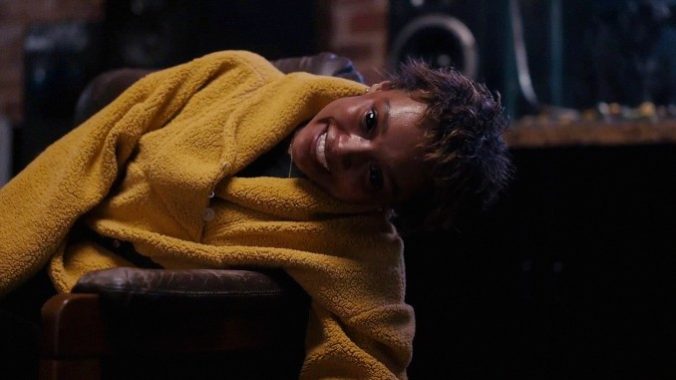The 20 Best Movies on Showtime

Showtime boasts one of the largest offerings of streaming movies of any premium cable channel with more than 500 movies available on demand. The channel not only has a massive library of films, but has a ton of exclusive movies that you just won’t find anywhere else. We’ve gone through its extensive catalog and collected the best movies available now.
And Showtime’s not just a cable add-on anymore: You can add a subscription to your Amazon, Hulu or PlayStation accounts or access it via Apple, Android or Roku devices via Showtime Anytime.
You can also check out our guides, some more updated than others, to what’s on other platforms like Netflix, Amazon Prime, Hulu, Max and Redbox, as well as The Best Movies in Theaters. Visit the Paste Movie Guides for all our recommendations.
Here are the 20 best movies streaming on Showtime now:
1. Hard Truths
Year: 2024
Director: Mike Leigh
Stars: Marianne Jean-Baptiste, Michele Austin, David Webber, Tuwaine Barrett, Ani Nelson, Sophia Brown, Jonathan Livingstone
Rating: R
Hard Truths follows the daily routine of outspoken Pansy (Marianne Jean-Baptiste) in the week leading up to Mother’s Day. Although the mentions of COVID are few and far between, there are remnants of that period of intense isolation left behind in Pansy’s behavior. She spends her days meticulously cleaning her house and pestering her son Moses (Tuwaine Barrett) about his lack of ambition while simultaneously warning him of the dangers of going outside. She feels everything in extremes and seems unable to sort through her emotions rationally, instead allowing these feelings to completely overwhelm her and dictate her interactions with others. Though she may initially come across as difficult, it becomes apparent that these are the actions of someone who is still recovering from a time where her interactions with others were few and far between.
Leigh is a dab hand at portraying nuanced and assertive female characters, and Hard Truths adds to his repertoire. Pansy is a thoroughly complex character, the likes of which actress Jean-Baptiste recently stated she rarely gets the chance to play. She’s prickly and acerbic, and Leigh forces us to sit with her nastiness for much of the film. She has bottled her frustrations for so long that when her emotions bubble over and her complaints are allowed out, they come in droves. She can’t stand “disgusting grinning people,” she bristles at any interaction with service staff, and she gets into screaming matches with strangers in car parks. If she isn’t calling her son lazy then she’s berating her husband or a sales assistant for daring to offer her any assistance and insulting their appearance in the process. All the evidence stacks up to build Pansy as one of the most unpleasant characters put to screen this year, but beneath this hardened exterior lies a woman so hurt by her circumstances that she doesn’t know how to move through the world with kindness. —Nadira Begum
2. Raiders of the Lost Ark
Year: 1981
Director: Steven Spielberg
Stars: Harrison Ford, Karen Allen, Paul Freeman, Wolf Kahler, Ronald Lacey
Rating: PG
A near-perfect distillation of the excitement and fun of the radio and pulp serials of yesteryear, Raiders of the Lost Ark established Harrison Ford’s wookie-free leading man credentials once and for all (with an assist from Blade Runner). The film also raises the question: Has anyone had a more impressive, more industry-transformative five-year run than Spielberg and Lucas did from 1977-1982? —Michael Burgin
3. Chinatown
Year: 1974
Director: Roman Polanski
Stars: Jack Nicholson, Faye Dunaway, John Huston
Rating: R
When you look at Jack Nicholson’s run of films in what I’ll call the “New Hollywood” era, starting with Easy Rider in 1969 and ending with The Shining in 1980, it’s truly astounding. There’s barely a dud on the list, so it’s really saying something that Chinatown, Roman Polanski’s crime classic, stands out among the best. The central mystery is bold for its complexity, revolving around water rights in 1930s Southern California—a plot that remains relevant today—and was undoubtedly an influence for the second season of True Detective. Like much of Polanski’s work, an ominous atmosphere works alongside the plot, shadowing every character in doubt and undermining the possibility of a clean conclusion. In Polanski’s world, the mere fact that a mystery is solved doesn’t mean there’s a happy ending, and his incredible powers of ambiguity have never been so strong as in Chinatown. Nominated for 11 Academy Awards, it won the Oscar for Robert Towne’s original screenplay. Add Nicholson at his most essential, along with a young Faye Dunaway and an aging John Huston, and this is truly one of the classics of American cinema. —S.R.
4. Inglourious Basterds
Year: 2009
Director: Quentin Tarantino
Stars: Brad Pitt, Christoph Waltz, Melanie Laurent, Diane Kruger, Eli Roth, Michael Fassbender, Daniel Brühl
Rating: R
Quentin Tarantino’s dual loves of vengeance and cinema have never had a purer expression than the face of a Jewish cinematheque owner projected Oz-like onto the smoke of Nazis aflame. The story goes like this: In the middle of the war, propagandist Joseph Goebbels plans to screen his latest pro-Nazi film for the party’s elite at a small Parisian theatre that is, unbeknownst to Goebbels, run by Shosanna Dreyfus (Melanie Laurent)—whose family was killed by SS officer Hans Landa (Christoph Waltz, evil incarnate with a gentleman’s face), and who is working in collaboration with American Aldo Raine (Brad Pitt) and his squad of Nazi-scalping Jewish soldiers. To an almost touching degree, Inglourious Basterds recognizes that the vengeance driving so many films—and certainly Tarantino’s own—is a cinematic impulse, a fantasy of light and sound, cleanly separated from common sense and actual history. It’s flippant, but in Tarantino’s low-rent, pulpy way, Basterds celebrates the well-known cases of Jewish resistance. —Robert Davis
5. Black Box Diaries
Year: 2024
Director: Shiori Itō
All stories documenting the personal anecdotes making up the #MeToo movement are courageous. Speaking up about a painful truth, knowing that if society at large was going to listen with generosity or empathy, well, it wouldn’t need a movement to get these tales told. They are brave alliances between survivors and journalists, battling entrenched sexism with unrelenting professionalism and mutual trust. Black Box Diaries tracks a moving #MeToo story that brought the movement to Japan, from the crime itself, through the journey of going public and to the uneasy closure of its long war of attrition. Its devastation is familiar. But because filmmaker Shiori Itō is both survivor and journalist, and recorded her own investigation into her assault in real time, the documentary becomes a thrilling testament to her exceptional, tenacious agency in the face of a hostile world.
A bit like how Navalny saw Russian opposition leader Alexei Navalny pursue the men Vladimir Putin sent to assassinate him, there’s a macabre adrenaline running through the first-person perspective of Black Box Diaries. Nobody has the same incentive to bring about justice than the survivors themselves. There’s also the same interconnectedness of sinister power on the other side: Itō’s attacker is Noriyuki Yamaguchi, biographer of then-Prime Minister Shinzo Abe, whose government maintained the same sexual assault laws for over a century. Yamaguchi’s political and police connections protect him from arrest at least once, and gets a helpful detective removed from Itō’s case. If all sexual assault cases are uphill battles, Itō’s is a Sisyphean conspiracy. And we get a front-row seat to the endless struggle. —Jacob Oller
6. Call Me by Your Name
Year: 2017
Director: Luca Guadagnini
Stars: Timothee Chalamet, Armie Hammer, Michael Stuhlbarg
Rating: R
In Kyle Turner’s Paste “review of Call Me By Your Name“:https://www.pastemagazine.com/articles/2017/10/call-me-by-your-name.html, he muses that in the film’s opening credits “there’s enough of a hint to suggest that, as Michael Stuhlbarg’s professorial patriarch Mr. Perlman mentions, the statues are ‘daring you to desire.’ The film, while occasionally inching towards it, never takes that dare.” Much has been made about whether the film flinches at the physical love it champions, or embraces with grace and decorum the same love, finding eroticism in other (maybe juicier, stickier) images. Regardless, the allure of Call Me By Your Name, the story of a 17-year-old rich white kid (Timothee Chalamet) and his Italian summer tryst with a hunky grad student (Armie Hammer), is in all of that anticipation and lazy anxiety, of never being quite sure what’s right for you because you’re not yet quite sure what “you” means. Perhaps Guadagnino never “takes that dare” because the film is less about the consummation of the two characters’ desires, and more about the dissolution of that consummation, the need to let it go for all its fantasy and excitement and confusion, and then to live with the quiet, needling regret that more could have been done, that somehow the desire, the sumptuousness of the flesh, should have been better grasped. It’s in Michael Stuhlbarg’s final, bittersweet monologue, as well as in Chalamet’s credits-long fireplace cry: Call Me By Your Name is an exquisitely shot movie, alive with the privilege and luxury of what it means to spend one’s formative sexual years in the Italian countryside, but more importantly, it’s a movie that aches far harder for the lives and relationships that could have been. —Dom Sinacola
7. The Return
Year: 2024
Director: Uberto Pasolini
Stars: Ralph Fiennes, Juliette Binoche, Charlie Plummer
Rating: R
The basic beats of Homer’s epic poem The Odyssey are familiar to millions thanks to high school English classes the world over, but the things you probably remember about its story, which follows the hero Odysseus’s decade-long journey home from the Trojan War, are the most fantastical. A saga of angry gods and vindictive goddesses, larger-than-life monsters and powerful sorceresses, The Odyssey sees its hero face off with everything from a six-headed dragon and a giant sentient whirlpool to cyclopes, man-eating giants, and Sirens. At various points in the story, he is kidnapped by a sea nymph, his men are turned into pigs, and he spends considerable time on an island whose inhabitants essentially do drugs all day.
Director Uberto Pasolini’s bleakly lush The Return isn’t interested in any of that. This Odyssey retelling is restricted to the poem’s more overtly human final third, in which Odysseus finally returns home to his kingdom of Ithaca. The film chooses to excise almost all of the original’s supernatural elements, opting instead to tell a gritty tale about war and trauma that manages to feel surprisingly modern for all its spears and loincloths. Without the handy excuse that the gods (or a witch or a random monster) made Odysseus do it, this stripped-down version of the story forces its hero to confront the trauma that becoming a legend has made of him and the loss he subsequently left in his wake. —Lacy Baugher Milas
8. Beau Is Afraid
Year: 2023
Director: Ari Aster
Stars: Joaquin Phoenix, Patti LuPone, Nathan Lane, Amy Ryan, Kylie Rogers, Parker Posey, Stephen McKinley Henderson, Hayley Squires, Michael Gandolfini, Zoe Lister-Jones, Richard Kind
Rating: R
I could see a lot of myself in Joaquin Phoenix’s perpetually overwrought Beau Wassermann, who finds that the world that he fears is out to get him really is. It’s the worst-case scenario for the nebbish Jew archetype. Beau Is Afraid is like if a Woody Allen protagonist was the Griffin Dunne character in Martin Scorsese’s After Hours, and the plot of that movie was pumped with existentialist steroids. It’s a paranoid, sexually repressed, labyrinthine odyssey with a schlubby hero—a bit like Under the Silver Lake, another movie that distributor A24 had no idea how to market to their clamoring, hyper-online, teeny bopper audience. And like After Hours, Beau Is Afraid similarly plays out like one really long joke. For his third and most ambitious film (I’m loath to conjure Magnolia comparisons), Aster leans all the way into the funny bone he was wont to exhibit in his seemingly ultra-austere first features, Hereditary and Midsommar. In Beau Is Afraid, Aster’s got a lighter, more playful touch despite the intimidating 179-minute runtime. Aster cultivates a uniquely absurd and off-kilter world, crafted meticulously by production designer Fiona Crombie, wherein character motivations are erratic, hilarious and questionably driven. In this strange universe (in which it’s never quite clear, or necessarily important, what the time period is), there is never a sense of safety for poor Beau. Even the idyllic suburban family home—which hosts a rehabilitating Beau after he’s hit by its owner’s truck (a bizarre incident which followed another bizarre incident involving invading hobos and Beau’s bathtub)—is its own well-tended house of horrors. Beau Is Afraid is very much a black comedy that utilizes well-placed horror techniques–Aster has a solid command of tension and loves to swing his camera to and fro to create a sense of vulnerability. Even scenes which purport deadly earnestness feel intentionally silly when one steps back and sees the bigger picture, in a film that can’t help but come across like, at its core, an intricate gag about the worst possible reality for a stereotypically paranoid Jew with mommy issues. Beau Is Afraid is more exciting than Aster’s debut and sophomore features, and not just because it’s more ambitious, slightly unwieldy and three hours long. It makes sense that a director like Aster would make his third film a sprawling epic–going so far as to incorporate impressive animation sequences of shifting media–after the head rush of initial acclaim. It’s admirable that it’s disarming, strange and deeply unserious, as if to rattle the critics who have called him the opposite. It also all pretty much works. It’s hard to say whether detractors of Aster, exhausted by prestige horror schtick, will be turned to the other side by Beau Is Afraid. It’s easy to continue to accept his tone at face value. But it does make you question if that’s what we’ve been mistakenly doing all along.—Brianna Zigler
9. Talk to Me
Year: 2023
Director: Danny Philippou, Michael Philippou
Stars: Sophie Wilde, Miranda Otto, Alexandra Jensen, Joe Bird, Otis Dhanji, Zoe Terakes, Chris Alosio
Rating: R
Talk to Me, the feature directorial debut of RackaRacka YouTube creators Danny and Michael Philippou is fierce, fun, and steeped in youthful energy. It’s a film that’s willing to go to some truly dark places in its exploration of grief, death and what it means when we reach too far into the beyond, but it’s also never afraid to laugh along the way. Talk to Me is a séance story, specifically a séance story revolving around a severed, ceramic-encased hand with a mysterious history. These days, the hand is hanging out in the possession of some Australian teenagers, who break it out at parties for 90-second “talk to me” sessions in which partygoers can briefly commune with, and be possessed by, the dead. It’s a quick thrill, the kind of thing perfect for taking smartphone videos to share on social media, and it’s all so detached and laugh-worthy that people either think it’s fake or liken it to a more pedestrian thrill like a drug trip. But when teenage Mia (Sophie Wilde), who recently lost her mother, hears about the hand, she’s eager to see if she actually can reach the other side, where her lost Mom might be waiting. Her best friend Jade (Alexandra Jensen) thinks it’s all fake, but she’s still willing to accompany Mia to a party, where a brief encounter with the hand will change both their lives. This is, even non-horror devotees will notice, a riff on classic séance narratives in which humans open a door that’s not to be trifled with, and let something dark and dangerous out. Talk to Me never tries to mask its roots in time-honored formulas, but approaches its tropes and recognizable story beats with an earnestness that’s both endearing and frank. And the horror, when it hits, hits with visceral intensity. Anyone who’s ever seen a RackaRacka horror short knows how well the Philippou brothers can craft a surprising scare, and those scares emerge with real ferocity in Talk to Me. At a time when we spend far too much energy trying to swing horror movies into one side or the other of a senseless binary, Talk to Me reminds us that fun and true existential terror don’t have to be mutually exclusive areas of storytelling. Talk to Me is as funny as it is frightening, as poignant as it is pulse-pounding, and the whole thing is rooted in a modern reality that feels like you could step into it tomorrow, which only adds to both the humor and the fear.—Matthew Jackson
10. Hell or High Water
Year: 2016
Director: David Mackenzie
Stars: Jeff Bridges, Chris Pine, Ben Foster, Gil Birmingham
Rating: R
David Mackenzie’s film gets the balance between genre and plot so right that, after a while, I forgot I was watching a genre film and simply found myself immersed in the lives of these characters. That is a tribute to not only the performances and Mackenzie’s direction, but also to Taylor Sheridan’s screenplay, which finds seemingly boundless amounts of colorful human detail and unexpected humor in what, on the surface, stands as a clichéd narrative. Hell or High Water is essentially a cops-and-robbers tale, with grizzled soon-to-retire veteran sheriff Marcus Hamilton (Jeff Bridges) and his deputy, Alberto Parker (Gil Birmingham), going after a brotherly duo of bank robbers: Toby (Chris Pine) and Tanner (Ben Foster) Howard. Sheridan’s characters are so fully imagined that, combined with actors and a director sensitive to the nuances in the script, we ultimately respond to them as flesh-and-blood people. But Sheridan—who tackled the moral difficulties of the drug war with his script for Sicario—has even bigger thematic game in mind. Hell or High Water is also meant to be a topical anti-capitalist lament, being that it takes place in a west Texas town that looks to have been decimated by the recent economic recession, with big billboard signs of companies advertising debt relief amid stretches of desolation, and with Toby driven in large part by a desire to break out of what he sees as a cycle of poverty for his loved ones, to provide a better life for his two sons and ex-wife. —Kenji Fujishima
11. The Mist
Year: 2007
Director: Frank Darabont
Stars: Thomas Jane, Marcia Gay Harden, Laurie Holden
Rating: R
A lot of the monsters and ghosts that terrorize a large and diverse group of protagonists in King’s work are excuses to deliver deft sociological studies on how easily members of a “civilized” society can toss out their polite and calm pretensions and let their reptilian brains, infused with fear and paranoia, take over in order to do horrific shit in the name of individual survival. From The Stand all the way to sub-par material like Trucks, there are many examples of this approach, but none are executed as efficiently and satisfyingly as Frank Darabont’s take on The Mist, King’s tale of a bunch of normal townsfolk gradually turning into a death cult when they’re trapped inside a grocery store after a mysterious mist that harbors a bunch of not-so-friendly monsters covers their town. The leader of the cult is the crazy, bible-thumping zealot played by Marcia Gay Harden, who’s mocked by others as she spews a bunch of apocalyptic bible verses but becomes a more and more credible voice, much to the chagrin of the more logic-based intellectual minority, as the creatures slither closer and closer to annihilating everyone. Thus a microcosm of our contemporary world is intricately mirrored, with a majority of weak minds ruled by fear, and the minority of levelheaded individuals powerless to stop the madness. Even if we were to take out the societal symbolism of the story, The Mist would still work as a terrific 1950s style monster flick that would have made William Castle drool. The shocking ending is a big plus or minus, depending on how much you like being traumatized by a work of fiction. —Oktay Ege Kozak
12. The Wrath of Becky
Year: 2023
Director: Matt Angel, Suzanne Coote
Stars: Lulu Wilson, Seann William Scott, Denise Burse, Jill Larson, Michael Sirow, Matt Angel, Aaron Dalla Villa, Courtney Gains, Kate Siegel
Rating: R
Clout-chasing tankie and dimwitted conspiracy theorist Jackson Hinkle declared this past April that “Gen Z is pro gun.” He was trying to be clever, and should’ve thought twice. Gen Z is demonstrably not pro gun, the only exception being one that proves the rule: Becky, Lulu Wilson’s mononymous psychopathic anti-hero protagonist of 2020’s Becky and its new follow-up, The Wrath of Becky. Becky loves guns, but mostly because they do handy work of blowing away white supremacists. Hinkle and Becky wouldn’t get along especially well. Granted, Becky doesn’t get along with anyone other than her Cane Corso pooch, Diego, and Elena (Denise Burse), her unofficial custodian and perhaps the only human worthy of her respect. The Wrath of Becky picks up a few steps ahead of where Becky left off, skipping past the police interrogation that concludes the latter to establish her as a ward of the state in the former. We don’t have data on how Zoomers feel about mindless ultraviolence, but the wholesale slaughter of hatemongers is a victimless crime, particularly when orchestrated with a total absence of pretense. Directors Matt Angel and Suzanne Coote, taking over for previous directors Jonathan Milott and Cary Murnion and tagging in with previous writer Nick Morris to co-write the sequel’s script, keep the premise simple: Fascists are horrible; let’s go kill ‘em all. The Wrath of Becky is “about” meaningful themes and ideas and events as a begrudging and unavoidable consequence of basing its heavies on the Proud Boys; it isn’t actually about anything other than the sheer titillating pleasure of watching the bad guys get dead. Nothin’ wrong with that! It’s built to thrill and made for chuckles, offset by Seann William Scott’s looming menace. Scott fulfills the same function as James in Becky: The funnyman stepping into the role of the heavy, uncovering the grim, callous side tucked in that persona. Wilson’s screen presence has expanded greatly since Becky, and her physicality matches her up well against Scott’s straight-faced intimidation. They’re a classic pairing, like the Road Runner and Wile E. Coyote, prey and predator in a reverse relationship: We know who’s supposed to be hunting who, but our expectations are continually upended with gory comedy. That The Wrath of Becky offers slapstick married with a kill tally and not much else is a feature, not a flaw.—Andy Crump
13. The Caine Mutiny Court-Martial
Year: 2023
Director: William Friedkin
Stars: Jason Clarke, Jake Lacy, Lance Reddick, Kiefer Sutherland, Monica Raymund
Rating: TV-14
The warm yellow hues of William Friedkin’s The Caine Mutiny Court-Martial immediately transports viewers to the TV dramas of the late ‘80s and early ‘90s. There is an undeniable draw that these sets–slick, contained, sparklingly clean—possess. Drawing you back to a simpler genre, where on-screen truth was something absolute and unable to cower in a dark corner. When the title flashes on screen in big, bold letters, these nostalgic impulses are being smartly manipulated. Over the course of film, Friedkin moves this story from a place of mind-numbing stability to shakier, amoral ground. Crucially, he understands that the courtroom drama, and the pictures they evoke, were never apolitical spaces. As such, he plays exclusively in the shadows cast from the court’s uneven power dynamics, making a case for every character’s complicity in the mutiny at hand. The Caine Mutiny Court-Martial follows Barney Greenwald (played by a predictably steely Jason Clarke), who must defend Stephen Maryk (Jake Lacy, who uses his slew of nice guy performances to smarmy effect) from charges of mutiny after seizing a naval ship from Commander Queeg (Keifer Sutherland). A small cast (including the late, great Lance Reddick as a judge who sparingly shatters the delicate proceedings with the boom of his arresting voice) is locked in the courtroom for the majority of the runtime, litigating the nuances of a story in which the facts—masked in excessive, uncompromising detail—slowly expose the ink-black rot coloring the American military. The Caine Mutiny Court-Martial isn’t Friedkin’s most sophisticated directorial effort, nor is it his most advanced thematic musing on man’s capacity for evil. Yet it enshrines him as an actor’s director, one capable of coaxing out subtle responses that can, by decimals of a degree, change the temperature in the room. In the film’s final scene, where everything suddenly, horribly clarifies into absolution, we are forced to take stock of our complicity. So won over by the easy nostalgia of the courtroom, we have allowed true perpetrators to slither into the shadowy halls ensnaring the main set, exiling innocent people from this warm light in the process.—Anna McKibbin
14. Past Lives
Year: 2023
Director: Celine Song
Stars: Greta Lee, Teo Yoo, John Magaro
Rating: PG-13
Named partially for inyun—a Korean concept encompassing fate, intention and consequence, like a reincarnation-bridging butterfly effect—Past Lives’ bittersweet romance brings to mind Longfellow’s ships passing in the night. Not because the decades-spanning relationship between Greta Lee’s Nora and Teo Yoo’s Hae Sung is inconsequential, but because it is consequential in spite of its briefness and its emotional opacity. It reminds us that it is possible to encounter magic, conjured by the flow of everyday actions, when we pass people multiple times along our lives’ intertwining rivers. It reminds us that tethering your life to someone else’s to brave the current together is an act of defiant perseverance. Drawing from a long tradition of yearning romances, while showcasing debut writer/director Celine Song’s unique abilities with precise writing and delicate scene-crafting, Past Lives flows from decade to decade with ease, encompassing immigration, coming-of-age, and creative and romantic ennui—only to reach a heartrending acceptance of our exquisite inability to have it all. Nora isn’t really caught between East and West, just as she is never really caught between her childhood crush Hae Sung and her husband Arthur (John Magaro). Whenever we meet her—whether as a kid, about to leave Hae Sung and Korea behind, or as a twentysomething connecting with him on Skype, or as a married woman hosting his visit to New York—she’s made her choices, or has had them made for her. Song’s strongest thematic thrust as she navigates the film’s three acts—spanning Nora’s childhood, loneliness, reconnection, loss and re-reconnection—is that this isn’t exceptional. Drawing from her own experience and a keen sense of psychology, Song writes clever, contained, jewel box conversations. They can have the hesitant, rekindling awkwardness of Yi Yi, or—thanks to an effective use of hairstyling and wardrobe (as well as the posture and demeanor of its leads)—the ambling melancholy of Richard Linklater’s meditations on time’s passage. But they all allow Lee and Yoo (both in star-making performances) quiet depth. Past Lives is a powerful and delicate debut, a beautiful necklace strung with crystalized memories. Its ideas on love and time, and how one impacts the other, are simple and sear across your heart. It is about all the potential people we could have been, and how none of them matter as much as the person we are—and the fool’s errand of trying to figure out what we’d be if we cobbled ourselves together differently. Those possibilities are best left in the past. Besides announcing Song as a brilliant observer of dialogue, interaction, and tone, Past Lives is a strikingly romantic movie about what composes our lives. We are the decisions we make, and the decisions others make for us. But we are also the collection of connections we make, living ship’s logs, dutifully recorded. Each repeat encounter is a minor miracle, and every first encounter has that potential. And there can be love in each, however brief.—Jacob Oller
15. Showing Up
Year: 2023
Director: Kelly Reichardt
Stars: Michelle Williams, Hong Chau, Judd Hirsch, André Benjamin, Heather Lawless, Amanda Plummer
Rating: R
Two years after her affecting First Cow hit theaters, Kelly Reichardt doesn’t stray from the Pacific Northwest setting where four of her other films take place. This time, she trades 17th century Oregon County for the present-day Oregon College of Art and Craft in Portland, where her exasperated lead, Lizzie (Michelle Williams), works as a day job. When she’s not working, Lizzie is crafting uncanny, rigid portraits of women in disjointed poses, whether in watercolor on paper or in tangible clay, the latter of which being the medium she’s chosen to showcase in an upcoming show. But before Lizzie can arrive at her big day, she has to navigate a whirlwind of chaos: Her dysfunctional family; the contentious relationship with her landlord, neighbor and fellow artist, Jo (Hong Chau); and a poor, injured pigeon that her cat, Ricky, tormented one night. In her fourth collaboration with Reichardt, Williams is better than ever. Possibly overdone in beleaguered, regular-woman makeup this time around, Williams still best showcases just how lived-in of an actress she can be in Reichardt’s work. Every sigh she utters feels pulled down by weights, her slouch hurts to look at; her exhaustion bounces off the screen and infects the audience like an illness. And in spite of how done-up she is in order not to look like an actress, it is primarily in the physicality of her performance and the candor of her dialogue that she is believable as Lizzie, struggling artist. There is never a moment where Michelle Williams slips through the performance. But she’s also surprisingly droll, with Reichardt and co-writer Jonathan Raymond penning a number of lines made comic in Williams’ perfect deadpan. Lizzie strikes as the new apex of Williams and Reichardt’s consistently fruitful relationship, each installment since 2008’s Wendy and Lucy another rung reached in which the two have further hewn the synchronicity between artist and muse. Like Lizzie’s patchy figures, Reichardt’s camera fixates on obscured body parts and jerky zooms as it follows Lizzie working towards her opening night amidst a near-comical string of setbacks. However, the throughline humming through all the maelstrom of Lizzie’s life is creative insecurity. It comes across in how Lizzie carries herself, how she speaks about her art and how she speaks to others. It’s the light, minimalist touch of Reichardt’s atmosphere and her nurturing of interpersonal subtleties that engenders an overwhelming emotional intensity as Lizzie finally sets up her work on display in the gallery. One single, small row of figures in the middle of a large, empty space.—Brianna Zigler
16. Confess, Fletch
Year: 2022
Directors: Greg Mottola
Stars: Jon Hamm, Roy Wood Jr., Kyle MacLachlan
Rating: R
The decades-long path to making another Fletch movie, littered with A-list stars and directors, ended in a movie with a barely-there theatrical release, and a quiet shuffle over to Showtime a month later—seemingly a classic case of misguided franchise-building anticlimax. But maybe the tossed-off release of Confess, Fletch makes sense, because the movie itself achieves such a perfect nonchalance, without slumping into the contemptuous indifference of Fletch Lives (the Chevy Chase sequel that’s responsible for Fletch going into cinematic hibernation in the first place). It comes down to how well writer, director and underappreciated comic craftsman Greg Mottola uses Jon Hamm, an actor who previously had to confine his comic instincts to Saturday Night Live-and-adjacent guest appearances and certain Mad Men line readings. As shoe-averse reporter-turned-detective Irwin Fletcher, Hamm rarely breaks his deadpan, even when he’s suspected of multiple murders. Is he a feckless wiseass, or a deceptively smooth operator? The movie is less about answering that question than getting on Fletch’s wavelength—made all the easier by Mottola’s unfussy, Soderberghian direction. At a time when so much great comedy has migrated over to television, it’s an especially rare treat to catch a comic mystery looking like a real movie. Can we have half a dozen more of these, please?—Jesse Hassenger
17. Kokomo City
Year: 2023
Director: D. Smith
Rating: R
One of the most exciting non-fiction entries to this year’s Sundance is a radical, on-the-ground pulpit from which four Black trans sex workers talk their shit. Putting transphobia within and without Black culture on blast, Kokomo City raises a curtain to reveal four stars: Daniella Carter, Dominique Silver, Liyah Mitchell and Koko Da Doll. Actually, make that five stars. Filmmaker D. Smith, a trans musician making her feature debut, keeps the rollicking conversations and righteously indignant monologues barreling along in beautiful black-and-white as we laugh, cry and commiserate with women whose experiences and insights are only outweighed by their personalities. From the opening anecdote, about a client setting a massive pistol on the bed as he receives head, you understand that these escorts are braver than the troops. Laughing off nightmares like that, running through lists of friends that have been killed by the same men paying them, their resilience forms the sobering foundation of an overwhelmingly entertaining experience. But of course, queer storytellers have always been able to—had to—turn tragedy into exuberant art. Smith refuses to undersell this seriousness while her aesthetic refuses to bury her subjects’ pop under their oppression: If Kokomo City lacks anything, it’s certainly not pizzazz. The soundtrack, some of which was provided by Smith, offers up lyrical laughs, as do the score’s sudden shifts (dopey cartoon tunes play when a worker recounts what it’s like to be approached by a stereotypically macho would-be client) and the on-screen subtitles that chronicle its fast-talking, no-holds-barred interviewees. Carter (the undeniable breakout of the bunch, exuding charisma and eloquent thoughtfulness) compares trans women to broken-down cars that still rev like hot rods—under attack but, defiantly, all the more extravagant for it. Kokomo City follows suit: It’s got a handmade underdog feel, loose and close and raw, but every DIY frame is fierce. Kokomo City vibrates with that energy in part because Smith did…pretty much everything. In addition to directing and contributing to the soundtrack, she also shot, edited and produced the doc. With that level of auteurism comes plenty of personality and a tight tempo. Aside from magnetic subjects that would give Portrait of Jason a run for its money, there’s a kineticism of shape and setting—hopping between New York and Georgia, between apartment couches and shadowy cars, between homes filled with love and those where the loneliness reverberates, between reenacting blowjobs and blowing smoke rings—that churns your body as the political, racial, queer theories put forth by the women dance in your mind. Hilarious, scary, tragic and sometimes flat-out jaw-dropping, Kokomo City is a gripping and accessible dissection of modern life, told through a brutally specific point of view.—Jacob Oller
18. Gangs of New York
Year: 2002
Director: Martin Scorsese
Stars: Leonardo DiCaprio, Cameron Diaz, Daniel Day Lewis, Jim Broadbent, John C. Reilly, Henry Thomas, Brendan Gleeson
Rating: R
This one split critics and audiences, but for all the times that the story about Leonardo DiCaprio and Cameron Diaz’s characters drains momentum from the movie, Daniel Day Lewis’ star turn as William Cutter, also known as the meat cleaver-wielding Billy the Butcher, really ratchets everything up to 11. Every villain deserves a grand entrance. Not many get better than Bill the Butcher’s. Within the opening scene, we are treated with a bloody brawl. From there, the character’s disturbed psychosis only spreads until its reaches one of the greatest climaxes in Martin Scorsese’s career. Oh, also Daniel Day Lewis. Did we mention that? —Paste Staff
19. Extra Ordinary
Year: 2020
Directors: Michael Ahern, Enda Loughman
Stars: Maeve Higgins, Barry Ward, Will Forte
Rating: R
It can be difficult to organically thread “romance” into horror-comedy, broadening a film to equally weigh a third major genre, but it’s the quirky relationship fodder where Extra Ordinary ultimately displays its greatest strength. This Irish indie never truly takes the frightening side of paranormal investigation seriously–it’s a true comedy all the way, and probably stronger for it–but it’s the unexpectedly quiet, thoroughly human lead performances that make it memorable. Those come from Irish actors Maeve Higgins and Barry Ward as two unassuming but uniquely talented people, imbued with abilities that allow them to touch the spirit plane rather more easily than they’re able to socialize with living, breathing humans. Higgins in particular really owns the character of Rose Dooley, imbuing her with a good-natured and immediately relatable soft-spokenness on top of an aura of melancholy that belies her ability to bring closure to spirits stuck in limbo. The scenes the two have together contain a certain warmth, a feeling that two people have been brought together who complete one another nicely–if only Ward’s ex-wife wasn’t still in the picture (in poltergeist form). Nevertheless, it’s Will Forte’s charismatic performance as washed-up prog rock star/demonic cultist Christian Winter that is likely to draw more U.S. viewers to Extra Ordinary, given that he’s the film’s most recognizable star. He makes the most of the opportunity to play another deeply eccentric character in a career that has been full of them, although his performance almost feels like something from a different movie when compared to the more grounded focus on the relationship between Higgins and Ward. That central duo, and their emerging rapport, make Extra Ordinary a heartfelt, breezy entry that gets a lot of mileage from very few moving pieces. —Jim Vorel
20. I.S.S.
Year: 2024
Director: Gabriela Cowperthwaite
Dr. Kira Foster (Ariana DeBose) is the newest member of the I.S.S. crew, a biologist who joins NASA to develop cutting-edge organ replacement research that can save lives. She joins a team that’s a 50/50 split between American astronauts and Russian cosmonauts, a seemingly friendly bunch who carry out a warm welcome celebration for the fresh recruit on her first day. However, during the merrymaking, a colleague offers a word of advice: To work in harmony, it’s essential to leave politics at the door.
Unfortunately, this tip becomes difficult to follow after the group witnesses something unbelievable. While looking down at North America, they witness a flash on the surface so big it can be viewed from orbit. And then another, and many more. High-ranking NASA astronaut Gordon Barrett (Chris Messina) and his Russian counterpart Nicholai (Costa Ronin) receive private messages from their respective governments that America and Russia have engaged in a nuclear war. They both receive orders to take the station “by any means necessary.” Delivering close-quarters anxiety, I.S.S. is unrelenting. Shortly after its early turning point, tensions exponentially escalate as these people size up if they think their former friends can do the unthinkable. Nick Remy Matthews’ intimate camerawork captures this constant proximity to potential enemies, and early scenes are rife with the captivating sense that things will go sideways at any moment. —Elijah Gonzalez






































